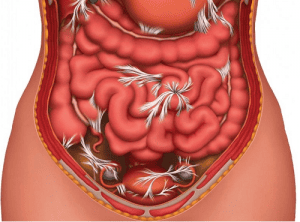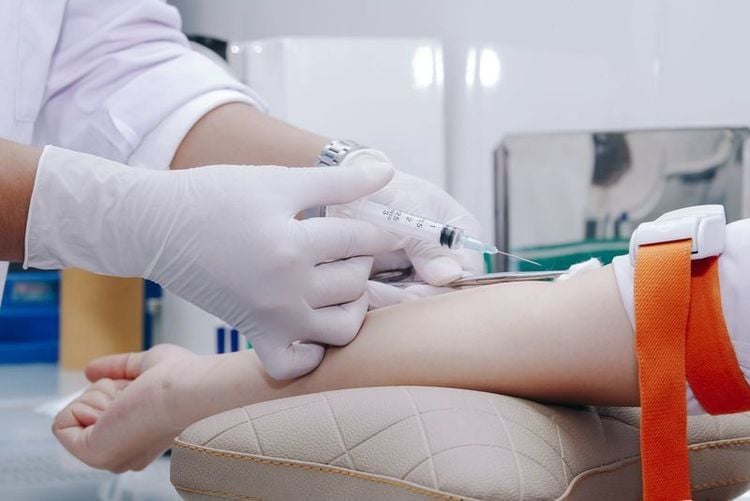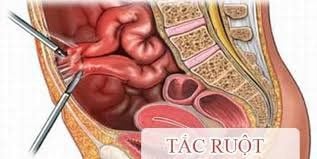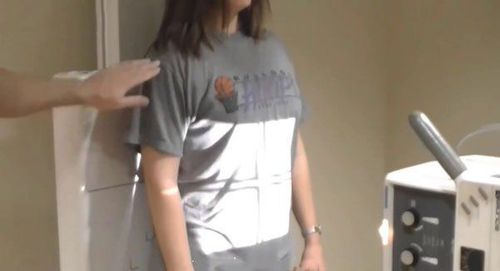This is an automatically translated article.
Foreign bodies in the small intestine can cause small bowel perforation, intra-abdominal abscess, peritonitis, or intestinal obstruction. Early surgical removal of the foreign body from the small intestine is necessary to avoid these serious complications. Laparoscopic foreign body removal is a method that is being widely used today.
1. What is a foreign body in the small intestine?
Digestive tract foreign bodies have many types. The most common are coins, bones from food,... Rarer are toothpicks, springs, pen caps, beer bottle caps, iron pins, paper clips,...
Foreign bodies in the small intestine can be causing bleeding, intestinal obstruction, intestinal perforation, causing peritonitis. Peritonitis is a very serious infection - poisoning, early death if not diagnosed, emergency surgery in time.
2. Laparoscopic surgery to remove foreign body in small intestine
Laparoscopic surgery has the advantage of reducing complications, reducing pain and reducing hospital stay for patients compared to the traditional open surgery method.2.1 Indications / contraindications Indications
Normally, 80 - 90% of foreign bodies will be excreted in the stool under the influence of intestinal peristalsis. Therefore, in cases of foreign body in the small intestine, the patient is monitored X-ray and stool characteristics. Indications for laparoscopic surgery in the following cases:
Intestinal perforation causing peritonitis; There are symptoms of intestinal obstruction but the abdomen is not excessively distended.

Bệnh nhân được chỉ định phẫu thuật khi thủng ruột gây viêm phúc mạc
Contraindications
Patients with weak health, shock due to infection or respiratory failure do not allow intra-abdominal inflation; People with a history of abdominal surgery many times.
2.2 Preparation for surgery Personnel: Gastrointestinal surgeon, anesthesiologist, anesthesiologist; Technical facilities: The operating room is qualified for trans-abdominal laparoscopic surgery; laparoscopic equipment set (light source, monitor, camera, CO2 source); unipolar and bipolar alternator systems; system of pumps, washing and suction of abdominal fluid; instruments for intestinal clamping, liver dissection, laparoscopic forceps, clamps and scissors; Patient: Discussed about surgery (purpose, procedure, risk of complications); fasting; gastric bypass; toilet; catheterization; perform basic tests, electrocardiogram, lung scan; early correction if there is disturbance of water and electrolyte balance; Medical records: Complete according to regulations.

Bệnh nhân thực hiện các xét nghiệm cơ bản trước khi phẫu thuật
2.3 Performing surgery Check medical records and patients, make sure the right person, the right disease; Anesthesia: Conduct endotracheal anesthesia; Patient position: Lying supine, legs closed; The surgical and anesthesiologist team stands in a suitable position convenient for manipulation; Place trocar: Place 1 10mm trocar below the navel for camera entry, 2 5mm trocars placed in the left iliac fossa and right iliac fossa for instrument insertion; Inflate the abdomen with a pressure of 10-15 mmHg; Abdominal assessment: Using a camera to view the abdomen, check if the patient has intestinal obstruction or small bowel perforation. The sign of intestinal obstruction is the dilatation of bowel loops above and below the obstruction. Signs of small bowel perforation is the appearance of digestive juices in the abdomen; Finding foreign bodies: Put the patient in a low lying position on the right side, use two intestinal forceps to turn the transverse colon up, each loop of small intestine to the ileocecal valve to find the location of the foreign body. Usually, if the bowel is obstructed, the foreign body is located at the junction between the upper dilated bowel loop and the lower collapsed bowel loop. If the intestine is perforated, it is easy to find the perforation, the foreign body protrudes from the intestinal wall. The surgeon needs to find the entire small intestine to avoid missing many foreign bodies; Foreign body treatment: After rinsing the abdomen thoroughly with warm water solution in case the foreign body causes a small bowel perforation, the doctor opens the abdomen about 2-3cm below the navel, takes the bowel loop out, cuts it along and removes the foreign body. out, then sew across. Next, return the intestine to the abdomen, drain the abdomen out through the trocar hole 5mm right iliac fossa if bowel perforation; Withdraw the instruments, close the trocar holes in the abdominal wall.

Thực hiện phẫu thuật nội soi lấy dị vật ở ruột non
2.4 Follow-up after surgery Monitor vital vital data including pulse, blood pressure, respiration, temperature,...; Monitor progress after surgery, use antibiotics in combination if there is peritonitis; Withdraw the drainage when there is no more fluid to be seen; Withdrawal of urinary catheter immediately after surgery, gastric circulation aspirates the accumulated fluid for about 3 days. When seeing signs of normal peristalsis or the patient can defecate, the stomach is removed; Monitor the activity of the digestive system, if the patient does not have abdominal distension, can be fed early. 2.5 Complications and management Surgical complications:
Tear serosa during manipulation: When the manipulation is too strong, the serosa or intestine may be perforated. Treatment is to remove the needle and suture the intestinal wall with separate stitches; Bleeding, hematoma due to tear of the mesentery of the small intestine: Treat by sucking the bleeding, immediately clamping the blood vessel and stopping the bleeding with sutures, tying or other tools. Complications after surgery:
Bleeding in the abdomen: Should re-operate soon to check and manage bleeding; Podium at the position of suture or mouth nodule: Should re-operate soon to handle; Narrowing of suture or anastomosis: Perform reoperation to address the cause of stricture. Foreign bodies in the small intestine can be fatal if not detected and treated early. Therefore, each person needs to be careful when eating, taking care of young children, the elderly, and people with mental illnesses to avoid the risk of swallowing foreign objects. In the unfortunate event of swallowing a foreign body, the patient should be examined early for timely intervention and treatment.
Any questions that need to be answered by a specialist doctor as well as customers wishing to be examined and treated at Vinmec International General Hospital, you can contact Vinmec Health System nationwide or register online HERE.













